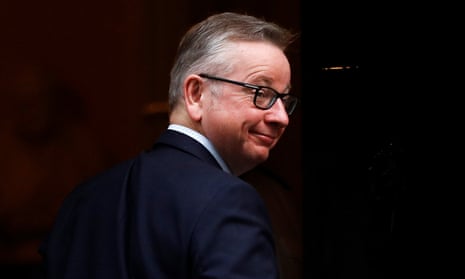We’ve all done it. You’re in a job interview, or are trying to send a message to the boss that you are ready for a big step-up. You start using the words that the tall people in suits use. They sound good. They lend you authority – you hope. They make you come across like someone who is ready to play in “the big leagues”– which is precisely the sort of phrase that the tall people in suits use.
Someone in the cabinet has got cross with Michael Gove for doing just that, using “long, economicky words” to send a message that he is ready to take over from Philip Hammond should next week’s budget – God forbid – not be a complete triumph.
What are the words and phrases that any aspiring chancellor of the exchequer should be seen and heard using to fast-track that promotion to No 11?
Here are a few suggestions:
Expansionary fiscal contraction
This is the theory, popularised by Ken Rogoff and Carmen Reinhart, which holds that public debt levels of over 90% of GDP will lead to slower growth, and that therefore significant cuts to public spending – aka austerity – are needed before growth can resume. George Osborne built a political programme and reputation on it.
Embarrassingly, the distinguished academics had to concede later on that there had been an error in their spreadsheet calculations, and that the theory was not quite as robust as had been asserted. Voters are now taking a similar, but less nuanced, view on the benefits of austerity. So on second thoughts, wannabe chancellors might not want to trumpet this one too loudly.
Zero lower bound
Years of ultra-low interest rates produce this phenomenon, whereby the central bank (the Bank of England in our case) can no longer stimulate the economy as rates are at rock bottom. The recent tweak up to 0.5% is the first move away from the floor that had been established. But the fact that rates will probably remain low for many months to come is a sign of economic weakness, not strength.
Post neo-classical endogenous growth theory
This was the phrase which, in the mid-1990s, brought economic theorising into the mainstream for the first time since Maggie’s monetarist experiment over a decade earlier. It was part of New Labour’s attempt to show that it was ready to govern, armed with a rock-solid piece of economic theory which sounded both daunting and complicated.
It could in fact be summarised crudely as “virtuous circle” economics: pro-growth policies would lead to further sustainable growth. But it got Michael Heseltine a big laugh at the Tory conference when he announced that the speech delivered by shadow chancellor Gordon Brown had actually been written by his adviser, Ed Balls. “It wasn’t Brown’s … it was Balls’!”, he said. How we laughed.
Fiscal headroom
Means “can we afford to cut taxes or not?” Chancellors with limited fiscal headroom cannot please the crowds with giveaways, and will hit their head on the ceiling in the study at No 11.
Sound money
When a Conservative needs to prove his or her credentials to reassure the City and business types, they start mumbling about “sound money”, as Douglas Hurd did during the Tory leadership election of 1990. It means keeping a firm grip on inflation. Some people like that sort of talk.
Laffer curve

This is a remarkable piece of economic wishful thinking, drawn up on a restaurant napkin, which states that cutting taxes for the rich will always and inevitably lead to economic growth, wealth trickling down and the reduction of government deficits. Ronald Reagan tried it in the 1980s. The deficit soared.
Forward guidance
This was the idea touted by Bank of England governor Mark Carney, that by indicating where interest rates and the economy were generally heading, more influence could be exercised without the need for market interventions. But markets and economic data have defied the guidance. We don’t hear much about this any more.
Pre-distribution
Never mind redistribution: what if wages rose and people needed less state support, cutting the benefits bill? This is pre-distribution, popularised by the US academic Jacob Hacker, and taken up by Ed Miliband. It never flew as a phrase, but the idea has life in it yet. Coming soon?
Cost-push, demand-pull inflation
Crudely, inflation can rise because of two things: through the costs of doing business going up, or as a result of excessive demand from customers. This label can be understood by anybody, and is therefore not much use in terms of bamboozling colleagues and impressing the boss.
DIY economics
The (genuine) economist John Kay has a term for all this: DIY economics. These are the things that we sort of think we know even if they have no basis in theory, or indeed practice. Like a dodgy shelf, DIY economics will come crashing down at your feet sooner or later. Michael Gove, beware.

